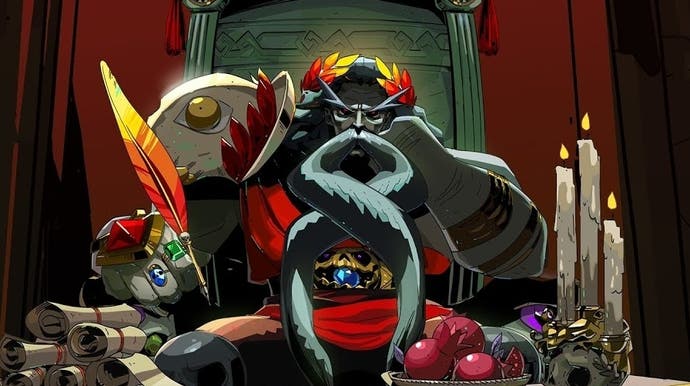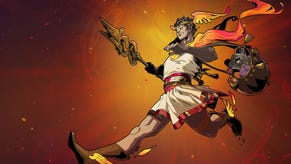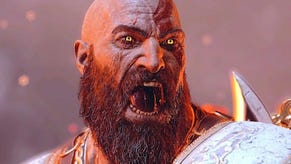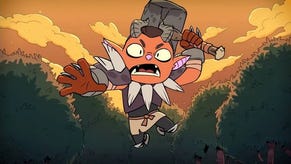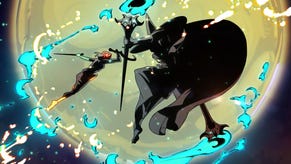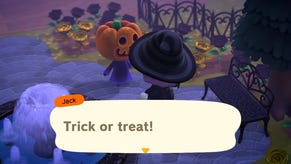Hades review - Of myth and mayhem
God tier.
I love what Hades is made of. It's made of mythology, of course - Zeus and Nyx and all that other spontaneous, terrifying, pitiable lot who have been lurking in their own form of Early Access for millenia. And it's made of everything the developer Supergiant has learned from making dashing, finely poised action games like Bastion and Transistor - and storied, wilful, luminous oddities like Pyre.
But it's also made of stone so smoothly polished it reads like glass or water. It's made of lap pools of blood, of palm columns shot through with arteries of twinkling jewels. Even when you're pushing a raft across lava there's a sense that the rocks around you are just so, that they melt and ooze because artists have thought about their insides, and are in love, above all else, with texture. After every run of Zagreus' attempts to escape the underworld, he returns to a house that is positively lurid with texture and sharp edges and glimmer. The famed gods live in a sort of McMansion, or a Las Vegas hotel's Presidential Suite, bad taste spared absolutely no expense. Of course they live somewhere like this. Maybe life and death is just one big casino. Maybe these gods play dice and then hit the slots.
Most of this textured stuff is designed to shatter. Hades is a Roguelite brawler, so each run is a run into hell and, hopefully, out the other side, and in between failures you spend earnings on new abilities and unlocks. But brawler is too padded and fleshy and imprecise a word, the clumsy heel of a palm, the stub of a haphazard elbow. During the run, during the failures, you are a wrecking ball with the focus of a laser, taking down pillars, slamming things into walls, blasting stone and crystal into shrapnel clouds of thick, gritty air. Supergiant chose Zagreus as a protagonist because he is a bit of a pencil shadow in the mythological texts - hazy shape and no real substance, a whisper of graphite. The writing team styles him as the kind of irresistibly arch Ivy League hardnut that Donna Tartt writes about so well, bruised cheekbones and dewy forehead, lip a dissolute twist just waiting to attain its precarious hold on a Gauloise. He is charismatic and chancy, refined without being remotely delicate. But then the game's action comes along and turns him into the part of every episode of The Property Brothers where teardown kicks in - mallet meets plasterboard and the sky is busy with splintered timber. The kitchen becomes a crater in seconds. The violence is backed by the unflinching heft of metal. What a complicated fellow.
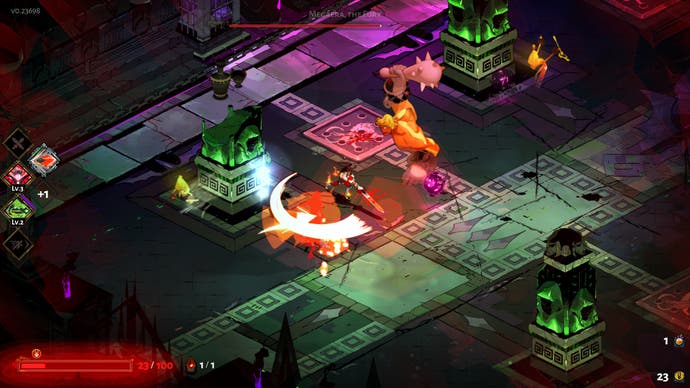
None of the rest of the game would matter if it wasn't fun to hit things. And on this topic, I've sometimes worried that Supergiant, a developer blessed and cursed with rare taste, is going to end up a victim of that taste, turning out theoretically exquisite mechanisms that chime a little hollow. I've worried that the team's output will even gloss away into mere brute luxury - Lambos or Swarovski swans. I'm wrong so far! What's surprising about Hades, to me at least, is how gutsy it is, how vitally in love with connection it is. It lives to clobber. Room after room of hell. You turn up and wait for horrors. The horrors arrive and, jeepers, you shred them. You pulverise them. I have never felt so sorry for the stuff of nightmares.
Combat is based on a main attack and a special, along with a dodge and a cast, which means you lob a glossy gem into a baddy and it does them ill, but then lodges there, annoyingly, for longer than you might want it to. Beyond that it's based on weapon choices that define how attacks and specials play out. Arrows and flinging shields are my favourite options to pick between at the moment - Hawkeye's fine, but it's great to be Captain America. Beyond that, though, or rather deep down and underneath it all - I was moving in the wrong direction with those 'beyonds' and now I can't fix it - it's about this feeling the game has. And it's the same feeling you get from the Vegas hotel landscape of the early areas, even when you're gadding through the heather of Elysium - you sock-slide and grip suddenly, smooth and swift and then THWACK. Everything is a spin on this feeling: coasting on air, and then colliding. The darting hummingbird and the copper-bottomed saucepan.
The things you're smacking around are wonderful. Even early on you can expect bloated ghosts with huge bellies, flesh stained the sunset colours of Florida cocktails, nasty little all-legged things with sacks of horrors on their backs. Later how about a massive snake of bones, a deadly library book stamp, bullet-hell witches and a field filled with butterfly spewing gumballs? Bosses are great and draw from the classics, but I particularly love a cluster of gems from the very first rooms that bobbles around before striking you from afar. It is so hard to be personally aggrieved by jewelry, but Hades manages to get you there. It makes glittering stone something you can hate with woozy passion.
These things come at you in waves, in procedurally scrambled rooms that have their own deadly doodads. In the first areas, you generally only have to worry about spike pits or turrets with trigger pads, so I leaned rather heavily on that dash. But then the second area throws lava everywhere, so overzealous dashing generally ends in unintentional barbecue. Onwards and upwards - risk and reward, risk and reward. And then...?
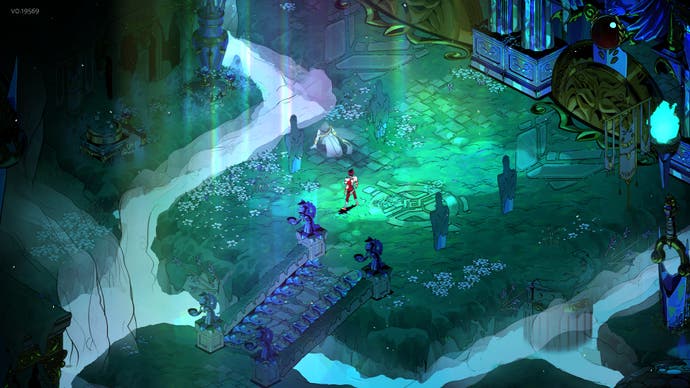
You choose which rooms to travel through from a handful of doors that appear when you clear out all the baddies. Generally you're picking between what kind of pay-off you want once the next battle is done. The old gods were so baldly transactional. More health? One of a handful of in-game currencies for levelling up over time? Or a chance to get a gift from the squabbling cast of ancients?
This might be one of my favourite things about Hades. Over many runs you get stronger and last longer and get different weapons to try out. Fine. But each individual run is shaped by the gods you meet and the things you choose when they offer you a handful of their themed perks to pick from. Like the contents of the shopkeeper's store in Spelunky, this stuff can really mix things up and define an adventure. And the choices are often almost impossible. A dash that poisons or an attack that poisons? More doom or a brand new special? Do I want the people I have already killed, right, to make living enemies sick?
The gods who deliver this stuff are wonderfully charming and untrustworthy and vain and drunken - the underworld is a Bluth Company construct, right down to the McMansion you all live in - but what really clicks for me is the way that this procedural game allows you to procedurally clip together your own Zagreus each time, and each time it's bittersweet because you know things won't fall together in quite this way ever again. It's sad in Spelunky when I don't get the jetpack, but for one glorious ten minute spell in Hades I had a shield that bounced around between enemies for a hilariously long time and left electricity in its clattering wake. I could chuck my shield, do the school run and return in time to catch it in the middle of a room in which everyone but me had been fatally pummelled in my absence. Meanwhile my dash spawned dark little infernal whirlpools that dragged enemies in for extra damage. Haven't Lego-bricked that one together again since.
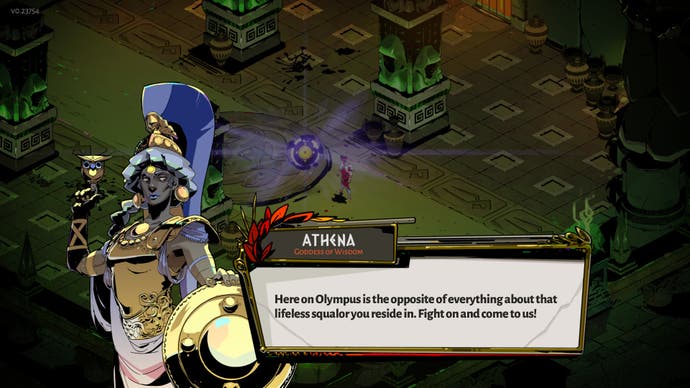
When it's done it's back to Dad's house to mope into the bedroom, spend a few upgrade points, chat to the relatives and then head out once more. Hell is a loop. Of course it is. But each circuit fills out the characters and deepens the connections until I have started to warm to Zagreus, for all his poise and chill.
All of which is to say: Hades is a proper lark. I love it. But there is something else here, something that I have always felt about games but never been able to put into words. There is something about polished, smartly conceived Hades, about so many of Supergiant's games which, the joyous brilliance of Pyre aside perhaps, are always too rigorous, too responsibly conceived not to know exactly what spot they're going to fit into on the shelf, which pillars they're going to present to the press - there is something about these games that are so assuredly products that reminds me that games are never ever just products. Games are always a way of being. To play Hades, Roguelite aside, economy aside, loop aside, is to be furious and vengeful, to be driven by bitterness, self-hate, ennui, to be pulverisingly powerful and yet horribly efficient. This is the truth of it down to the controls, which encourage you to grip the pad by the facebuttons and squeeze and squeeze and squeeze like you're one stress ball away from telling your boss to shove it.
This game comes from Hell, and it takes you back there, and it's brilliant. Get in.
